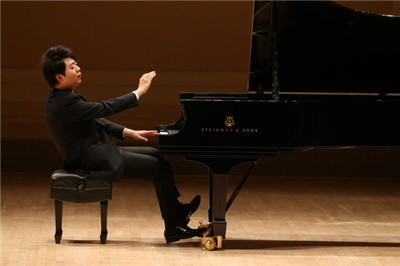(单词翻译:单击)
Because the Metropolitan Museum of Art has largely redirected its concerts to tie in to its exhibitions, the notion of a recital by the crowd-pleasing Chinese pianist Lang Lang to usher in “China: Through the Looking Glass” made sense, perhaps, on the surface.
大都会艺术博物馆(Metropolitan Museum of Art)为了配合其所举办的展览,在很大程度上改变了其音乐会的定位。因此,找来广受欢迎的中国钢琴家郎朗开钢琴演奏会,为名为《中国:镜花水月》的展览揭幕的想法合情合理,或许在表面上是这样的。
But in the Met Museum Presents event, on Thursday evening, Mr. Lang played only four modest pieces of Westernized Chinese music, filling 15 minutes of the hourlong program, alongside works by Tchaikovsky and Chopin. Set in the cavernous Great Hall near the front entrance, the concert was clearly designed less to add context to the exhibition than to generate interest in it.
周四晚间的演奏会是现场艺术展示活动Met Museum Presents的组成部分,历时一个小时,但朗朗只用15分钟演奏了4首风格内敛的中国曲目,而且对它们做了西化处理。其余时间里,他都在演奏柴科夫斯基(Tchaikovsky)和肖邦(Chopin)的作品。这场演出是在靠近前门、空间高阔的大堂里举行的,显然,其目的更多地是为展览增加人气,而非增进人们对展览背景的理解。

And in that it may well have succeeded. Fifteen minutes before the scheduled start time, the line outside the museum extended down the entrance steps and a block or so up Fifth Avenue.
从这种意义上说,它或许相当成功。演出还有15分钟就要开场的时候,博物馆外排起了长队,从门口的台阶开始,沿着第五大道(Fifth Avenue)排了差不多一个街区那么长。
A half-hour later, Mr. Lang took the makeshift stage before more than 500 loudly welcoming visitors and announced, “I’m your pianist for tonight.” Perhaps wishfully, he also praised the acoustics of the room, calling them “very spiritual.”
半个小时后,朗朗走上临时搭建的舞台,向500多位到场者高声致意,并宣布,“今晚由我为您演奏。”他还赞美了大厅的音响效果,称其“非常有灵性”,而这或许有些臆断。
My experience from about 40 feet from the stage was the opposite. With megaton amplification, the loud playing in the outer sections of two Chopin scherzos and in two pieces from Tchaikovsky’s “The Seasons” was deafening and soul-deadening.
坐在距离舞台40英尺远的地方,我的感受与他截然不同。他演奏肖邦的两首诙谐曲和柴科夫斯基《四季》(The Seasons)套曲中的两首曲目时,首尾部分的琴声被无限放大后简直震耳欲聋,灵性全无。
The four Chinese items, by composers little known in the West, and the six numbers from “The Seasons” (out of 12 in all, one for each month) were character pieces, designed to set scenes and moods (“Autumn Moon Over a Calm Lake”). Excellent playing and even some poetry came through in the quieter music. But the merciless pummeling in Tchaikovsky’s “Reaper’s Song” and “The Hunt,” and in the Chopin, pretty much obliterated everything around it.
四首中国曲目(其作者在西方少为人知)和来自《四季》套曲的六首曲目(共有12首,每月一首)都是性格小品,旨在阐释背景、烘托氛围(《平湖秋月》)。弹奏较为安静的乐曲时,他弹得非常好,甚至可以让人感受到诗意。但在弹奏柴可夫斯基的《刈者之歌》(Reaper’s Song)和《狩猎之歌》(The Hunt)以及肖邦的作品时,他让人记住的只剩下对琴键的猛烈敲击。
Mr. Lang declined an encore at first, instead introducing Derek Wang, a young protégé developed through the Lang Lang International Music Foundation. Mr. Wang said he would play two Chopin études but was hustled off after one.
朗朗起初拒绝了对返场曲的请求,而是介绍郎朗国际音乐基金会培养的年轻音乐家汪振波(Derek Wang)出场。汪振波说他要弹奏两首肖邦练习曲,但一首过后就被催促着下了台。
He gave an attractive, shapely account of the “Revolutionary” Étude. He actually seemed to judge the amplification better than Mr. Lang had, though he may also simply have lacked some of Mr. Lang’s power.
汪振波把肖邦的《革命》(Revolutionary)练习曲演绎得很好,也很动人。他对扩音效果的判断似乎比朗朗好,不过,也有可能是他缺乏朗朗那样的力量。
Finally, Mr. Lang played a pleasant encore, the “Turkish March” from Mozart’s Piano Sonata in A (K. 331), and audience members roared their approval, seemingly unanimous.
最后,朗朗加演了一首欢快的返场曲目,莫扎特(Mozart)的《土耳其进行曲》(A大调K.331)。观众一片欢呼,似乎都很赞赏他的表演。
Still, I heard what I heard. How could I not?
不过,我自己还是耳听为实。不是吗?


